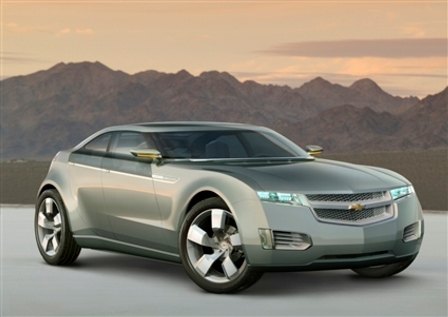CA Air Resource Board Gives Chevy Volt Extra Credit
The Los Angeles Times is calling it "a significant blow for environmentalists and transportation activists." On Thursday, California's Air Resources Board (CARB) voted to "slash" the number of emission-free vehicles automakers must sell in the state by 70 percent. The panel adopted new rules that would require the largest companies selling cars in the state to produce 7.5k electric and hydrogen fuel-cell vehicles from 2012 to 2014. (Down from the 25k under rules set in ‘03.) In addition, carmakers will be called upon to make about 58k plug-in hybrid electric vehicles in the same period. CARB also decided overhaul its entire Zero Emission Vehicle (ZEV) program, to align it with tougher greenhouse-gas emission standards. CARB board member Daniel Sperling says "it's my view that both plug-in hybrids and [emission-free vehicles] are tremendous stretches for the industry." But Chelsea Sexton, the executive director of Plug In America says "It's a huge blow, they sent the message to the carmakers that they can always get what they want from the board." And here's the kicker: GM asked for "special consideration" for the Chevy Volt. GM's executive director for environment, energy and safety argued that the Volt will have a longer range than rival plug-in hybrids so, you know, cut us some slack. The board granted that request, valuing extended-range plug-in hybrids more highly than shorter-range models. GM has yet to sell a single Volt, but hey, why let the facts get in the way?
Glenn is a baby-boomer, born in 1954. Along with his wife, he makes his home in Connecticut. Employed in the public sector as an Information Tedchnology Specialist, Glenn has long been a car fan. Past rides have included heavy iron such as a 1967 GTO, to a V8 T-Bird. In between those high-horsepower cars, he's owned a pair of BMW 320i's. Now, with a daily commute of 40 miles, his concession to MPG dictates the ownership of a 2006 Honda Civic coupe which, while fun to drive, is a modest car for a pistonhead. As an avid reader, Glenn enjoys TTAC, along with many other auto-realated sites, and the occasional good book. As an avid electronic junkie, Glenn holds an Advanced Class amateur ("ham") radio license, and is into many things electronic. From a satellite radio and portable GPS unit in the cars, to a modest home theater system and radio-intercom in his home, if it's run by the movement of electrons, he's interested. :-)
More by Glenn Swanson


































Comments
Join the conversation
Wow. Tough crowd. Maybe by lowering the requirements they might spur some development? And times are a bit clearer with regard to actual achievable engineering goals than they were in '03. I mean, if the rules are going to pre-empt you from making a profit, why try at all?
Glenn, Please let me explain my extra credit remark. What I was thinking was that a) The Volt will likely never qualify because it either will not ever be built or meet the requirements, and b) that they were not giving the Volt SPECIFICALLY extra credit. The last part is key because our legislatures have been making the mistake of writing laws that are down right unethical because they keep narrowly picking the winners (even to the point of actually naming the technology). IOW, it is wrong for government to subsidize or require corn based ethanol. If they want a pollution restriction, or a renewable requirement, or some other attribute they should write a framework that let's the market find the best methods and products to meet those requirements. In the case of the long range plug ins, then it actually makes sense to give extra credit to cars that can run more miles because they will likely displace more pollution.
@ Landcrusher Ah, okay-- now I see your point. :-)